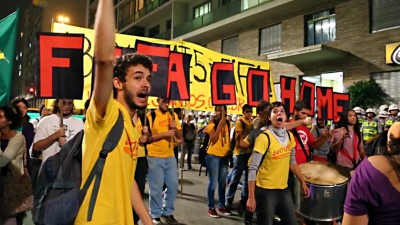Shifting Blame: The Grand FIFA Cover-Up

“It [the Garcia report] must be made public. That is the only way FIFA can deal with the complete loss of credibility.” – Reinhard Rauball, President of the German Football League, Nov 16, 2014
It seemed cheeky of them, but it could not have been any other way. Football’s governing body, FIFA, is a creature that is beyond reform. Solidly entrenched, heavily overgrown, and incapable of brooking an approach that might refresh its functions for the broader goals of football, it resists change with fundamentalist commitment. Every effort that has been made thus far has fallen.
The suspected improprieties associated with the award of the hosting rights for the 2018 games to Russia, and the 2022 games to Qatar were dismissed by FIFA. There was simply no need to revisit the bidding process, given that any irregularities were “minor” to warrant a dramatic reopening. FIFA ethics judge Hans-Joachim Eckert had given the organization, and the countries accused of corruption, a stunningly good bill of health. Instead, Eckert advised President Sepp Blatter to go on the offensive, citing “his duty” to lodge a complaint in the Swiss courts. (Blatter’s record on suing, as opposed to his threats to sue, are poor.)
Eckert did find irregularities, not with the Qatar and Russian bids, but with the English bid for 2018 and the Australian bid for 2022. While England did cooperate with Michael Garcia’s ethics investigation, the team was ticked off for trying to woo Concacaf president Jack Warner with a sumptuous £35,000 dinner, and offering help with finding part time work for someone on his behalf (The Guardian, Nov 14).
In an act of fabulous casuistry, the judge did not see any connections with the bid and Qatar’s funding for global football development, sponsorship of the African Football Congress in Angola in 2010, and questionable payments to Argentina when playing Brazil in a friendly in Doha in 2010. Former Asian Football Confederation president Mohamed Bin Hammam did make “several improper payments” to the higher-ups of African football, and forked out $1.2m to stop former FIFA executive member Jack Warner from taking the stand against him. But again, no evident connection existed between the payments and the actual bidding process.
In what must be the black comedy that inheres in that particularly body, Blatter claims ignorance of the contents of the original Garcia report, authored by FIFA’s much sidelined ethics committee. Garcia himself has been outmanoeuvred, suggesting that his findings have been misrepresented. Eckert’s 42-page summing up of the unreleased 430-page report was evidently less summing than distorting measures of substraction. A cleaning job became a covering one.
It also seems that an aggressive posture is being taken against whistleblowers, evidenced by the dismissive remarks in Eckert’s summary over such individuals as Bonita Mersiades, head of communications for Australia’s 2022 bid. The summary by Eckert, according to Mersiades, says that FIFA “got their decisions right in respect to Qatar and Russia, and there’s even a sentence and a reference in there that Sepp Blatter ran a wonderful process. It’s almost like high comedy” (The Guardian, Nov 16).
The low comedy side of it came with the fears expressed by the other whistleblower, Phaedra Al-Majid, who claims she will “look over my shoulder for the rest of my life” in connection with allegations of corruption over Qatar’s bid. Under pressure from Qatari officials, she retracted allegations in 2011 that votes were being bought. She raised the issue again with Garcia, and also with the FBI, who visited her in September 2011.[1]
Blatter is also doing his best to use the law as a pretext for preventing any action on the issue of the bids. He intends to bury the Garcia findings in the archive of recommendations that will never see the light of day. “If FIFA were to publish the report, we would be violating our own association law as well as state law.”[2] Consent would need to be sought from all individuals detailed in the findings. Being decent about the law is a good thing when improprieties are being concealed.
What then, in response? If FIFA can’t be reformed, it can be weakened by members who wish to leave. The President of the German Football League, Dr. Reinhard Rauball, is certainly of that view, claiming that UEFA’s 54 member nations may well take the step of leaving the governing body if the Garcia report is not published in full. The rift that had taken place between Garcia and Eckert “was a breakdown of communication, and it has shaken the foundations of FIFA in a way I’ve never experienced before.”[3]
Rauball’s suggestions: publish the ethics committee findings, and Garcia’s bill of indictment “so it becomes clear what the charges were and how they were judged.” Otherwise, “you have to entertain the question of whether you are still in good hands with FIFA.”
Former English Football Association chairman David Bernstein has also put his hat into the ring of opponents, arguing that the FA needs to lobby UEFA for a European boycott of the next World Cup. “FIFA is sort of a totalitarian set-up.”[4] No reform would mean no participation.
For all this heated talk, FIFA remains the official governing body, functioning as silencing oppressor and knotty guardian. Dissent, much like an institutionalised church, is dealt with from within, rather than without. Even Garcia is playing by the rules of internal resolution, taking Eckert’s purportedly distorted summary before the appeals committee. Playing it by the book is fine, as long as the book is not itself rotten.
Dr. Binoy Kampmark was a Commonwealth Scholar at Selwyn College, Cambridge. He lectures at RMIT University, Melbourne. Email: [email protected]
Notes

